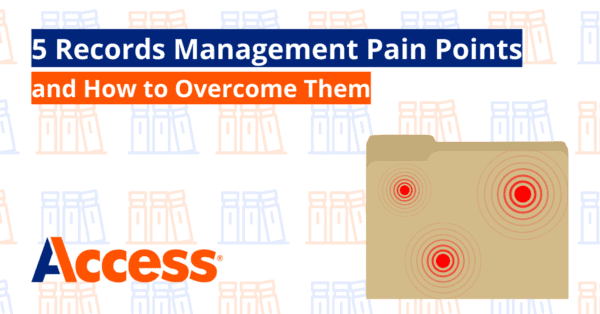
Every business has its core competence, whether it’s offering legal advice, managing clients’ financial portfolios, taking care of patients, or the hundreds of other essential services small and medium businesses provide. But every business also has to manage tasks that are not their core competence, such as managing important records.
When a business stores or processes sensitive records—including healthcare, legal, and financial data—it is subject to a host of administrative and legal obligations. Records management is a complex and challenging journey, but when done right, it can generate real value for your business. However, without an effective approach to records management, businesses typically face a variety of pain points that hinder efficiency and compliance.
Insecure Records Storage
In 2020, 155 million records were accidentally or maliciously exposed. Most data exposures result from human error. In 2019, a healthcare provider exposed patient medical records by leaving them in a dumpster. Every year, millions of records are leaked from improperly configured cloud platforms. Even the biggest financial institutions aren’t immune—in 2021, customers of a major financial services provider were hit by a breach that exposed names, social security numbers, and addresses.
The cost of compliance failures is high. For example, a Tier 1 HIPAA violation has a minimum fine of $100 per violation, with a maximum up to $50,000. A Tier 4 violation has a minimum fine of $50,000 per violation. All of which gives businesses a problem: how can they store physical and digital records securely while ensuring they are accessible when required?
Inability to Locate Records
Records are useful only if you can use them to find the information you need. But to enable efficient and accurate records access, records must be classified, categorized, and stored in a searchable system. That becomes increasingly challenging as record volume grows.
The more records you have, the more difficult and expensive it is to process and store them. Consequently, many organizations have little insight into the records they store or how to access information efficiently.
In addition to the administrative challenges, the inability to locate information has compliance implications. Many businesses must store records to be compliant, but keeping them isn’t enough. They must be able to produce relevant records for regulatory bodies and auditors. For example, financial services companies are required by FINRA to create, store, and produce many different records.
Managing Secure Access
Inadequate identity and access management is a common cause of data exposures and compliance failures. On one hand, records must only be accessible to authorized individuals. On the other hand, access should be straightforward for those who need it. In fact —operational efficiency is affected when employees struggle to get the information they need to do their jobs.
Implementing a secure identity management system isn’t always straightforward; that’s why so many records are leaked from cloud platforms, even though they give users the tools to manage access securely. Many businesses are still getting it wrong. The truth is that leveraging a modern cloud platform’s powerful access management tools is no guarantee that data security, privacy, and confidentiality can be maintained.
So, what do you do? Keep reading…

Information Management: From Clay Tablets to the Cloud and Beyond
Information management has evolved dramatically over the centuries. The very first records were written over 5,000 years ago on clay tablets by the ancient Sumerians, and today our information can be accessed with the click of a button.
Records Retention Scheduling
Regulatory standards require businesses to store records for a specific period and securely destroy them once that period has elapsed.
Many businesses find this challenging for several reasons:
- They need to understand which regulations apply to each record, which means records must be classified and categorized.
- Records must be monitored throughout their lifecycle to ensure they are stored and destroyed in line with relevant regulations.
- Legal and regulatory retention requirements differ depending on the nature of the records. HIPAA has different requirements to FISMA, for example.
An Evolving Regulatory Environment
Our final pain point to highlight is that none of what we have discussed here so far, is static. As regulations evolve, businesses must also change their processes and record storage systems to meet any new requirements. This can be particularly onerous for financial services businesses, where record retention and production requirements change frequently. It also impacts healthcare, legal, insurance, HR, manufacturing, education, and government services, among others.
How An Effective Records Management System Helps
To recap, following is a summary of the above pain points and how an effective records management system offers solutions to each of them.
- Insecure records storage — records management systems provide secure off-site storage for physical and digital records.
- Inability to Locate Records — records management systems can classify and categorize records. This way, they can be easily searched via a secure online portal, enabling authorized users to find the information they need quickly.
- Managing Secure Access — purpose-built records management software includes robust and sophisticated identity and access management and a comprehensive log of access requests.
- Records Retention Scheduling — an updated schedule ensures that records are managed throughout their lifecycle in line with relevant regulatory requirements and are then securely destroyed.
- An Evolving Regulatory Environment — retention and compliance software continually tracks hundreds of thousands of requirements, updating systems and controls as required.
To learn more about how Access’ document, information, and records management services help businesses to reduce costs while easing the burden of compliance, contact one of our information and records management specialists today.




